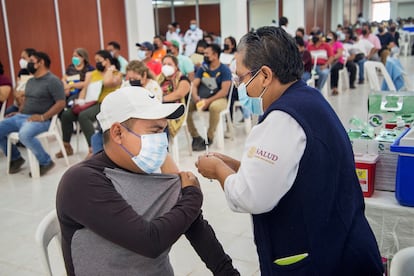Mexico’s health services are starting to buckle under the strain of omicron
Reported coronavirus case numbers are reaching new records on a daily basis while over 100 hospitals are at full capacity

The omicron variant is continuing its unstoppable spread in Mexico, confirmation that the country is arriving at the peak of the wave as has happened in the rest of the world. In less than a week Mexico has registered three daily records in terms of case numbers in line with Europe and the United States, where day by day numbers have been exceeding those of the day before.
Beyond the frightening speed the variant has taken on, all eyes are on the capacity of the Mexican health system to hold up against omicron. The US last week broke its own record for hospitalizations with 140,000 in one day and while in Mexico the level of vaccination – key to not placing the health system under unbearable strain – is considerably higher, there are still millions of unvaccinated Mexicans and people who have not yet been fully inoculated. In Mexico City, for example, 81% of patients in hospital have not received the full course of vaccination.
On Sunday, January 16, 19,000 new cases and 76 deaths were registered in Mexico, bringing the total number of Covid-19-related fatalities to 301,410 since the start of the pandemic. The highest daily number of cases was recorded on Saturday, with 47,000 reported. The Mexican health authorities have acknowledged that, based on death certificates, the death tally could be closer to 451,000 and that in reality the country may have amassed up to 4.5 million cases.
In the past month, Mexico has registered more than 300,000 active cases and the number of patients occupying hospital beds has doubled. Just a month ago, on December 15, Mexico had 18,000 active cases but in a single day on January 16, 19,000 were added. During that timeframe, hospital admissions have risen from 15% to 29% with the number of serious cases – patients that have been put on ventilators – jumping from 12% to 17%.
Official data confirms that omicron is hitting hardest in the center of the country, principally in Mexico City, the nation’s most populous city and where by far the highest number of tests are carried out. The latest coronavirus wave is also being keenly felt in Morelos and in places such as Chihuahua, Nuevo León and Jalisco, in the north of Mexico, according to the Covid-tracking IRAG (severe acute respiratory infection) network.
Up to last Thursday, 115 of the almost 1,200 hospitals in Mexico were reporting bed occupancy of 100% and 47 more said they were at over 60% capacity, according to the Secretariat of Health. In Mexico City there are seven public hospitals at 100% capacity and a further four at near to 70% from a total of 60, according to official data. Figures from IRAG, which is part of the Secretariat of Health, show 23 hospitals at full capacity. The official numbers released on Sunday, however, say average occupancy stands at 30% and the number of intensive care beds in use for Covid-19 patients is at 17%.
The reality is that in some centers like the publicly run Hospital General La Raza to the north of Mexico City, one of the hospitals that according to the National Institute of Respiratory Diseases is at 100% capacity, hundreds of people are lining up on a daily basis seeking everything from appointments to coronavirus tests. Doctor and researcher Andreu Comas García warns that health services for Covid-19 and other conditions is on the ropes due to the number of medical and administrative personnel who have been infected with coronavirus themselves. “We have to stop downplaying omicron as a minor flu, as the federal government has been doing, when we know that it is a virus that affects the entire body,” said García, of the Center for Health Sciences and Biomedicine at the Autonomous University of San Luis Potosí, during an interview with local media. In order to try and alleviate the burden, authorities in Mexico City are looking into repurposing staff in the coming days and weeks.
We have to stop downplaying omicron as a minor flu, as the federal government has been doing, when we know that it is a virus that affects the entire bodyAndreu Comas García, Autonomous University of San Luis Potosí
Despite the warning and the weight of the data, federal authorities have been attempting to downplay the impact of the omicron strain. President Andrés Manuel López Obrador, who last week contracted Covid-19 for the second time, has described it as “mini-Covid” while Health Secretary Jorge Alcocer has stated that children can be treated for coronavirus symptoms perfectly well with “Vicks VapoRub and paracetamol.”
Days earlier, the under-secretary for health and the public face of the government’s national Covid-19 strategy, Hugo López-Gatell, ruled out vaccinating the under-15s, stating that this age bracket is not an at-risk group. At the same time, in Mexico City, head of government Claudia Sheinbaum insisted that schools will remain open and left the capital’s Covid “green light” in place for a further week. The data, however, shows that children are also contracting coronavirus. In the first nine days of January 4,000 children were infected, according to the National System for the Protection of Children and Adolescents, a 4.3% rise on the figures reported up to December 31.
Some local governments, such as Ecatepec, in the state of Mexico, and Orizaba, in Veracruz, have made face masks compulsory under the threat of an 864-peso ($42 or €36.80) fine. In Ecatepec, there has been one arrest for refusal to comply with the order. Since the start of the year eight people have died from Covid-related illnesses in Ecatepec, leading local authorities to impose the mask mandate last Wednesday. Refusal to wear a mask in public places like markets, town squares and on public transportation will be punished with up to five hours of community service or detention lasting between two and eight hours.
Mexico is currently 16th in the world in terms of confirmed coronavirus cases and it has the fifth-highest number of Covid-related deaths, behind the USA, Brazil, India and Russia, according to Johns Hopkins University figures.
Tu suscripción se está usando en otro dispositivo
¿Quieres añadir otro usuario a tu suscripción?
Si continúas leyendo en este dispositivo, no se podrá leer en el otro.
FlechaTu suscripción se está usando en otro dispositivo y solo puedes acceder a EL PAÍS desde un dispositivo a la vez.
Si quieres compartir tu cuenta, cambia tu suscripción a la modalidad Premium, así podrás añadir otro usuario. Cada uno accederá con su propia cuenta de email, lo que os permitirá personalizar vuestra experiencia en EL PAÍS.
¿Tienes una suscripción de empresa? Accede aquí para contratar más cuentas.
En el caso de no saber quién está usando tu cuenta, te recomendamos cambiar tu contraseña aquí.
Si decides continuar compartiendo tu cuenta, este mensaje se mostrará en tu dispositivo y en el de la otra persona que está usando tu cuenta de forma indefinida, afectando a tu experiencia de lectura. Puedes consultar aquí los términos y condiciones de la suscripción digital.









































